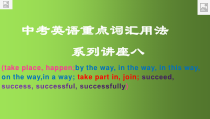 PPT
PPT
【文档说明】中考英语重点词汇用法系列讲座八21张课件.pptx,共(21)页,861.022 KB,由小橙橙上传
转载请保留链接:https://www.ichengzhen.cn/view-257932.html
以下为本文档部分文字说明:
中考英语重点词汇用法系列讲座八(takeplace,happen;bytheway,intheway,inthisway,ontheway,inaway;takepartin,join;)•学习目标:•1.不学习并辨析take
place与happen的用法。•2.学习并辨析bytheway,intheway,inthisway,ontheway,inaway的用法•3.学习并辨析takepartin,join的用法•4.学习并辨析succeed,success,successful,succes
sfully的用法•用法讲解:•1.takeplace•(1)takeplace意为“举行,进行”。例如:•Thefootballgamewilltakeplacetomorrow.足球比赛明天举行。•(2
)takeplace还有“发生;产生”之意。例如:•GreatchangeshavetakenplaceinChina.中国已经发生了巨大的变化。•辨析:takeplace与happen•(1)takeplace表示“发生、举行、举办”,一般指非偶然性
事件的“发生”,即这种事件的发生一定有某种原因或事先的安排。例如:•Whenwilltheweddingtakeplace?婚礼什么时候举行?•(2)happen作“发生、碰巧”解,一般用于偶然或突发性事件。例如:•Whathappenedtoyou?你发生了什么事?(一般不说:W
hatdidyouhappen?)•【注意】happen与takeplace通常都没有被动语态。•小测试:•—Whathashappenedinyourhometown?•—Greatchanges_
____inmyhometownrecently.•A.havebeentakenplaceB.havetakenplace•C.havebeenhappenedD.washappened•用happen或takeplace的适当形式填空。•(1)Abadaccide
nt____tothatfamily.•(2)Themeeting_____at8:00amasplanned.用法讲解:1.bytheway意为“顺便说一下”。在句中作插入语,用逗号隔开。例如:•Bytheway,haveyouseenHarryrecently?•顺便说一句,
你最近见过哈里吗?•2.intheway意为“挡路”。例如:Sorry,youareintheway.对不起,你挡路了。•3.inthisway意为“用这种方法”。例如:•Inthisway,hehascollectedagreatmanystamps。用这种方法他收集
了大量的邮票。•4.ontheway意为“在去某地的路上”。例如:•Onthewaytothestation,Iboughtsomechocolate。在去车站的路上我买了些巧克力。•5.inaway从某种意义上说。例
如:•Inaway,itisanimportantbook。在某种意义上,这是一本重要的书。•小测试:•1.Hersociallifegot________ofherstudies.•她的社交生活妨碍了学业.•2.Theworkiswelldone___________.•从某种程度
上说,这工作做得不错。•3.Theworkshouldbedone_________.•应该这样做工作。•4.Sheis____________thepark.•她正在去公园的路上。•5._________,doyouhaveanyideawher
ethepostofficeis?•顺便问一下,你知道邮局在哪儿吗?•用法讲解:•takepartin•takepartin意为“参加”,常指参加群众性的活动、会议、劳动、游行等,往往指参加者持有积极的态度,起一定作用。takepartin之后接名词或动
名词。例如:•Ididn’ttakepartinthesportsmeetingyesterdaybecauseIwasill.•我没有参加昨天的运动会,因为我病了。•Everyonecantakeparting
ardening.•每个人都可以参加到园艺活动中来。•join•join是动词,意为“加入”。指加入某一党派、组织或社会团体,以及参军等,并成为其中一员。其后常出现club,army,team,group以及人称代词宾格等。例如:•j
ointheswimmingclub参加游泳俱乐部•jointhearmy参军joinus加入到我们的行列•小测试:1.Areyougoingto________thefirstexperiment?2.I'llpersuadehimto_____ourclub.3.Mybrother_
___theArmylastyear.4.—Areyougoingto_______ourEnglishclub?5.Tom__________the100-metersraceaweekago.•用法讲解:•1.succeed表示“成功”,是不及物动词;succeed后通常接indoings
th,表示做某事做成功了。•例如:•Hisplansucceeded.他的计划成功了。•Atlasthesucceededinsolvingtheproblem.•他终于把那个问题解决了。•Shesuc
ceededin(passing)theexam.她考试及格了。•2.success表示抽象意义的“成功”,是不可数名词;表示具体意义的“成功的人或事”,则是可数名词。例如:•Failureisthemotherofsuccess.失败是成功之母。•Hisn
ewbookwasagreatsuccess.他新出版的书获得了巨大成功。•3.successful作形容词,意为“成功的”。例如:•Theperformancewassuccessful.演出很成功。•Itwasasuccessfulexperiment.那是一次
成功的试验。•4.successfully副词,“成功地”,修饰动词。比如:•Hefinishedthetasksuccessfully.他成功地完成了那项任务。•IpassedtheEnglishexamsuccessfully.我成功地通过了英语考试。•
小测试:•1.Heisa_______man.•2.Heworkedoutthedifficultproblem________.•3.We_______infinishingtheimportanttask.•4.Atlast,theboyclimbedthemountain_____.
 辽公网安备 21102102000191号
辽公网安备 21102102000191号
 营业执照
营业执照